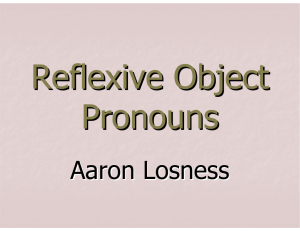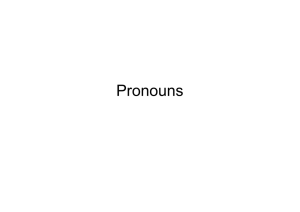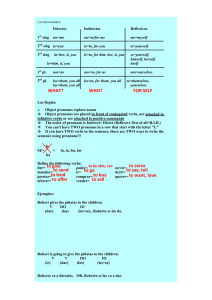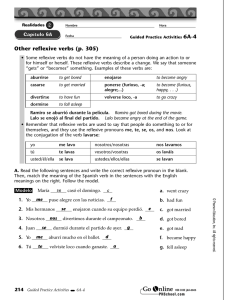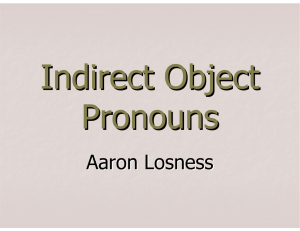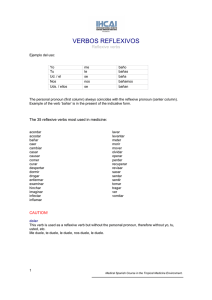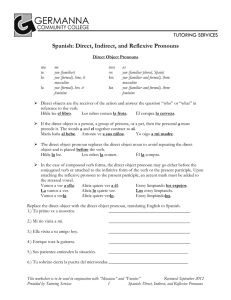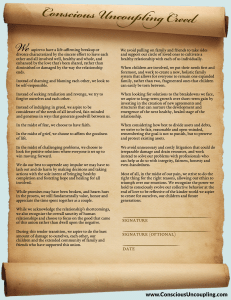Spanish Pronouns-RID Rule
Anuncio
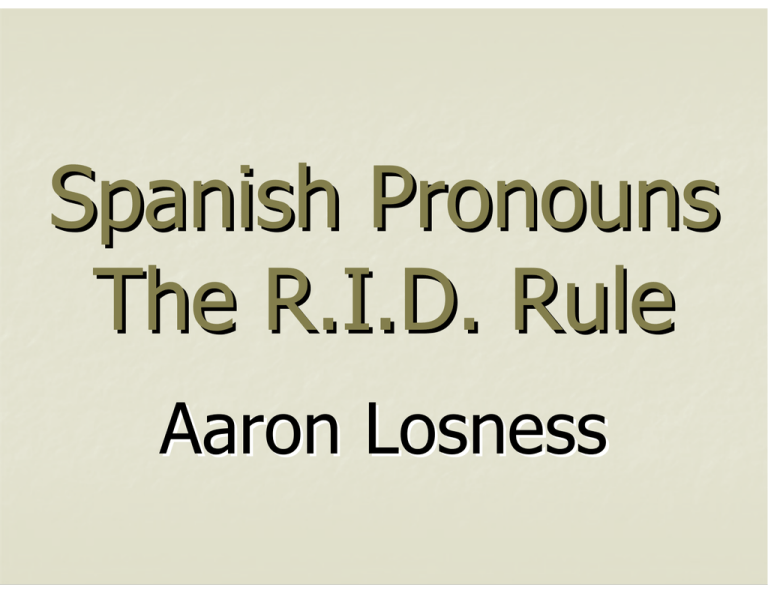
Spanish Pronouns The R.I.D. Rule Aaron Losness RID: Sentences with Two Object Pronouns When you have two object pronouns in a sentence, they will appear in RID order: reflexive, indirect, and direct. The two most common are: Reflexive-Direct Indirect-Direct I buy it (direct) for myself (reflexive). Me lo compro. Do you (reflexive) wash it (direct) a lot? Te lo lavas mucho? I write it (direct) to you (indirect). Yo te la escribo. She sells them (direct) to me (indirect). Ella me las vende. The La La Rule: When both the Direct and Indirect are in the 3rd person, both pronouns will begin with l. When this happens, change the 1st on to se. I give it (direct) to them (indirect). Yo le lo doy. Yo se lo doy. Reflexive me (myself) nos (ourselves) Indirect Object me (me) nos (us) Direct Object me (me) nos (us) Te (yourself) te (you) te (you) se (himself, herself, yourself) se (themselves, yourselves) le (him, her, you, it) les (them, you) lo/la (him, her, you, it) los/las (them, you) QUIZ TIME!!! Pronoun Quiz Myself (Reflexive)__________ Him (Indirect)_____________ Them (Direct)_____________ Yourself (Reflexive)________ It (Direct) _______________ You (Indirect)_____________ Ourselves (Reflexive) ______ Me (Indirect)_____________ Us (Direct)_______________ Himself (Reflexive)__________ Them (Indirect)_____________ Her (Direct)________________ Themselves (Reflexive)_______ You (Direct) _______________ Us (Indirect)_______________ Yourselves (Reflexive) ______ It (Indirect)_______________ Me (Direct)________________ RID: Sentences with Two Object Pronouns Reflexive me (myself) nos (ourselves) Indirect Object me (me) nos (us) Direct Object me (me) nos (us) te (yourself) te (you) te (you) se (himself, herself, yourself) se (themselves, yourselves) le (him, her, you, it) les (them, you) lo/la (him, her, you, it) los/las (them, you) He gives it (D) to me (I). __________________________ She tells it (D) to you (I). _________________________ We give it (D) to you (I). _________________________ I prepare it (D) for myself (R). ______________________ She buys them (D) for herself (R). ___________________ He sings it (D) to her (I). __________________________ RID: Sentences with Two Object Pronouns Reflexive me (myself) nos (ourselves) Indirect Object me (me) nos (us) Direct Object me (me) nos (us) te (yourself) te (you) te (you) se (himself, herself, yourself) se (themselves, yourselves) le (him, her, you, it) les (them, you) lo/la (him, her, you, it) los/las (them, you) I sell it (D) to him (I). _________________________________ She cooks it (D) for them (I). ____________________________ I don’t have it (D) for you (I). ____________________________ I never buy them (D) for myself (R). ________________________ He doesn’t pay me (R) for it (D) in cash. _______________________ We don’t buy them (D) for ourselves (R). _____________________ RID: Sentences with Two Verbs 1. 2. Either attach both pronouns directly to the second verb. You must add an accent mark on the final syllable of the infinitive to retain the natural accent. Place the two prounouns before the first conjugated verb. Reflexive me (myself) nos (ourselves) Indirect Object me (me) nos (us) Direct Object me (me) nos (us) te (yourself) te (you) te (you) se (himself, herself, yourself) se (themselves, yourselves) le (him, her, you, it) les (them, you) lo/la (him, her, you, it) los/las (them, you) I want to give it (D) to you (I). ___________________ _________________ We want to say it (D) to him (I). __________________ _________________ You have to send it (D) to me (I). _________________ _________________ She can do it (D) for herself (R). __________________ _________________ You can hide it (D) from us (R). __________________ __________________ We have to sell it (D) to her (I). __________________ __________________ RID: Sentences with Two Verbs 1. 2. Either attach both pronouns directly to the second verb. You must add an accent mark on the final syllable of the infinitive to retain the natural accent. Place the two prounouns before the first conjugated verb. Reflexive me (myself) nos (ourselves) Indirect Object me (me) nos (us) Direct Object me (me) nos (us) te (yourself) te (you) te (you) se (himself, herself, yourself) se (themselves, yourselves) le (him, her, you, it) les (them, you) lo/la (him, her, you, it) los/las (them, you) I should bring it (D) to them (I). ______________________ ______________________ Can you write it (D) for me (I)? ______________________ ______________________ Do you want to leave it (D) for me (I)? _________________ ______________________ I don’t want to leave it (D) for you (I). __________________ ______________________ Doesn’t he need to give it (D) to her (I)?_________________ _____________________ We don’t have to buy it (D) for them (R). _________________ _____________________ ANSWER KEY!!! Pronoun Quiz Myself (Reflexive) me Him (Indirect) le Them (Direct) los/las Yourself (Reflexive) te It (Direct) lo/la You (Indirect) me Ourselves (Reflexive) nos Me (Indirect) me Us (Direct) nos Himself (Reflexive) se Them (Indirect) les Her (Direct) lo/la Themselves (Reflexive) se You (Direct) me Us (Indirect) nos Yourselves (Reflexive) se It (Indirect) le Me (Direct) me RID: Sentences with Two Object Pronouns Reflexive me (myself) nos (ourselves) Indirect Object me (me) nos (us) Direct Object me (me) nos (us) te (yourself) te (you) te (you) se (himself, herself, yourself) se (themselves, yourselves) le (him, her, you, it) les (them, you) lo/la (him, her, you, it) los/las (them, you) He gives it (D) to me (I). Él me lo da. She tells it (D) to you (I). Ella te lo dice. We give it (D) to you (I). Te lo damos. I prepare it (D) for myself (R). Me lo preparo. She buys them (D) for herself (R). Ella se las compra. He sings it (D) to her (I). Él se la canta. *La-La Rule RID: Sentences with Two Object Pronouns Reflexive me (myself) nos (ourselves) Indirect Object me (me) nos (us) Direct Object me (me) nos (us) te (yourself) te (you) te (you) se (himself, herself, yourself) se (themselves, yourselves) le (him, her, you, it) les (them, you) lo/la (him, her, you, it) los/las (them, you) I sell it (D) to him (I). Se lo vendo. *La-La Rule She cooks it (D) for them (I). Ella se lo cocina. *La-La Rule I don’t have it (D) for you (I). No te lo tengo. I never buy them (D) for myself (R). Nunca me las compro. He doesn’t pay me (R) for it (D) in cash. Él no me lo paga en efectivo. We don’t buy them (D) for ourselves (R). No nos las compramos. RID: Sentences with Two Verbs 1. 2. Either attach both pronouns directly to the second verb. You must add an accent mark on the final syllable of the infinitive to retain the natural accent. Place the two prounouns before the first conjugated verb. Reflexive me (myself) nos (ourselves) Indirect Object me (me) nos (us) Direct Object me (me) nos (us) te (yourself) te (you) te (you) se (himself, herself, yourself) se (themselves, yourselves) le (him, her, you, it) les (them, you) lo/la (him, her, you, it) los/las (them, you) I want to give it (D) to you (I). Te lo quiero dar. Quiero dártelo. We want to say it (D) to him (I). Se lo queremos decir. Queremos decírselo. You have to send it (D) to me (I). Me la tienes que mandar. Tienes que mandármela. She can do it (D) for herself (R). Ella se la puede hacer. Ella puede hacérsela. You can hide it (D) from us (R). Tú nos lo puedes esconder. Puedes escondérnoslo. We have to sell it (D) to her (I). Se lo tenemos que vender. Tenemos que verdérselo. RID: Sentences with Two Verbs 1. 2. Either attach both pronouns directly to the second verb. You must add an accent mark on the final syllable of the infinitive to retain the natural accent. Place the two prounouns before the first conjugated verb. Reflexive me (myself) nos (ourselves) Indirect Object me (me) nos (us) Direct Object me (me) nos (us) te (yourself) te (you) te (you) se (himself, herself, yourself) se (themselves, yourselves) le (him, her, you, it) les (them, you) lo/la (him, her, you, it) los/las (them, you) I should bring it (D) to them (I). Se lo debo traer. Debo traérselo. Can you write it (D) for me (I)? ¿Me lo puedes escribir? ¿Puedes escribírmelo? Do you want to leave it (D) for me (I)? ¿Me lo quieres dejar? ¿Quieres dejármelo? I don’t want to leave it (D) for you (I). No te lo quiero dejar. No quiero dejártelo. Doesn’t he need to give it (D) to her (I)? ¿No se lo necesita dar? ¿No necesita dárselo? We don’t have to buy it (D) for them (R). No se lo tenemos que comprar. No tenemos que comprárselo. THE END!!! alosness@hotmail.com www.losnessgroup.com/Spanish_lessons.html
